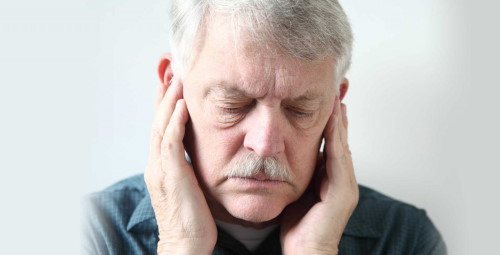Ahh…the sounds of silence. It’s so relaxing.
But for many people, there is NO silence–but instead there’s a buzzing, ringing, humming, hissing, roaring, or even shrieking sound. While it may be quiet outside your head, inside there may be constant noise. The sound can be soft or loud– high-pitched or low-pitched. Tinnitus can come and go–get worse or get better.
This condition is called ‘tinnitus’ and it can be maddening.
BREAKING: Eat This - Never Forget A Single Thing Again
Many doctors believe there is absolutely nothing wrong with your hearing, but tinnitus can most definitely interfere with hearing, sleeping, or everyday conversations. And unfortunately, the problem can get worse with age. When tinnitus gets bad, it can affect your relationships, your work, your sleep, and your peace of mind.
As many as 50 to 60 million people in the United States suffer from this condition, and it’s especially common in people over age 55.
Pulsatile Tinnitus
One of the worst parts about tinnitus is that only you can hear the noise. When your tinnitus is cause by a heartbeat or heart murmur, your doctor may also be able to hear it with a stethoscope. This pulsating sound is called “pulsatile tinnitus”.
Be aware, if you suddenly notice new pulsatile tinnitus, it’s important to consult a doctor, because it could signal something going on with your heart or blood vessels that should be checked out by a medical professional.
Hearing Loss
Many people with constant tinnitus have some degree of hearing loss. Things that may cause hearing loss include loud noise (especially if you’re exposed to long-term loud noise), medications, impacted earwax, allergies, middle ear problems or Meniere’s disease.
Medications
Some medications can cause or worsen tinnitus as well. These include:
- Aspirin or other NSAIDS like ibuprofen or Aleve.
- Antibiotics such as ciprofloxacin, doxycycline, gentamicin, erythromycin, tetracycline, tobramycin, and vancomycin.
- Antimalarials such as chloroquine and quinine.
- Anticonvulsants including carbamazepine (Tegretol), and valproic acid (Depakote).
- Certain cancer drugs, including cisplatin (Platinol) and vincristine (Oncovin, Vincasar).
- Loop diuretics (especially in high doses) including bumetanide (Bumex), furosemide (Lasix), and torsemide (Demadex).
- Certain antidepressants such as amitriptyline, clomipramine, and imipramine.
Sinus Congestion
Colds, sinus infections, the flu and allergies can all trigger tinnitus. Sinus congestion builds up in the eustachian tubes and creates pressure in the ear. This can cause ringing, buzzing or roaring sounds. In addition, air pressure changes like being in an airplane can exacerbate this condition, making it even worse.
Foods
Yes, some foods can even cause tinnitus flare-ups, even foods that don’t seem to bother you otherwise. These foods can be foods that can cause an allergic reaction, foods you are sensitive to, or foods that increase inflammation in the body—and therefore the ears. While it is different for everyone, it can often be attributed to inflammatory foods like refined grains—especially gluten and dairy—which can increase congestion in the head.
Alcohol and tobacco can impact overall health and increase inflammation in the body, worsening tinnitus. For some, excess sodium can affect blood pressure which then affects tinnitus.
Sweets and sugar, which raise blood glucose can also bring on tinnitus attacks as well. One study found that 84-92% of people with tinnitus had hyperinsulinemia, otherwise defined as having too much insulin in the blood—which is often a response to high blood sugar. When blood sugar levels rise, insulin is released in the body to move sugar from the bloodstream into the cells to avoid the damage that can occur in veins, arteries and nerves.
Thyroid Dysfunction
Hypothyroid problems can cause low energy levels, weight gain, slow digestion, constipation, and tinnitus. Hyperthyroid symptoms cause a racing heart, anxiety, weight loss, hair loss and are also related to tinnitus. Tinnitus is actually a very common problem for those with hypo- or hyperthyroid dysfunction. The exact mechanism for the connection between thyroid dysfunction and tinnitus is not known. But what is known, is that tinnitus will often reduce or resolve once the underlying thyroid issue is addressed.
Menopause Hormonal Fluctuation
Right around the same time as menopause, women report increases in the incidence of tinnitus that seem to be linked to the rise and fall of hormone levels. Because women often complain of this during pregnancy and around menstrual periods, as well as during perimenopause or menopause, there seems to be a hormonal connection.
There is also some evidence to suggest that taking HRT (hormone replacement therapy) can also worsen tinnitus. It is thought that rising and falling levels of estrogen may be affecting tinnitus and inflammation. Menopausal symptoms such as sweating, hot flashes and mood changes seem to correlate with tinnitus. Fluctuating levels of estrogen can also interfere with thyroid function, and it has been found that some menopausal women with tinnitus may benefit from thyroxine (T4) which is one of the thyroid hormones.
Stress
While tinnitus is often a symptom related to hearing loss or other medical issues, stress can definitely exacerbate or trigger tinnitus. For many, the tinnitus can actually bring on more mental stress and anxiety, creating a vicious cycle that is hard to stop. Reactions to how we deal with stress depend on our own autonomic nervous system and our emotional filters.
Dealing effectively with stress can often help lessen the tinnitus. This can be done with breathing exercises, meditation, yoga or just regular vigorous exercise.
Inflammation
Some great strides have been made into the connection between brain inflammation and tinnitus. Dr Shaowen Bao from Arizona College of Medicine have found a definite connection to brain inflammation and tinnitus in studies published in PLOS Biology Journal.
A common cause of tinnitus is due to hearing loss from to loud noises. Dr. Bao and associates found that inflammation in the sound-processing region of the brain triggers tinnitus. Inflammation is our body’s response to injury and trauma. Other studies also show that noise-induced hearing loss causes inflammation in the brain’s auditory pathways. Reducing inflammation in the brain may be the best route to improving or eliminating tinnitus.
How Does Tinnitus Happen?
The difficult thing about treating tinnitus is that it can originate from anywhere along the auditory pathways. The auditory pathway consists of the outer ear, the middle and inner ear, and the brain’s auditory cortex, where the sounds are interpreted. A common cause of tinnitus is damage to the hair cells in the cochlea. When the circuits in the brain don’t receive the appropriate signals, the brain produces abnormal nerve signals to compensate for the missing input.
Tinnitus Risk Factors
There are many different conditions and disorders that affect nerve channels leading to the ears, which can cause someone to hear abnormal ringing or other sounds in their ears. These conditions usually cause other physical symptoms at the same time including things like dizziness, hearing loss, headaches and loss of balance.
Tinnitus Treatments
There is no ONE treatment for tinnitus, but a visit to your physician or alternative care doctor may result in any of these suggested treatments:
- Hearing Aids—Some tinnitus can result from hearing loss that results from repetitive loud sounds such as loud music. (Haven’t we all had ringing ears after that loud rock concert?)
- Sound Therapy—This type of therapy utilizes four different approaches: masking, distraction, habituation, and neuromodulation.
- Prescription medications—Antidepressants and antianxiety medications are commonly used for tinnitus.
- Supplements— These are usually a combination of herbs and vitamins, often including zinc, ginkgo, and vitamin B-12, although few studies support this treatment.
- Acupuncture—This treatment is effective in reducing the loudness and severity for some types of tinnitus.
- Behavioral Therapy–Tinnitus can cause a high level of emotional stress including depression, insomnia and anxiety.
None of these things have been scientifically proven to get rid of tinnitus, although some treatments do help some people.
Other natural treatments include changing lifestyle habits such as giving up smoking and cutting back or eliminating alcohol. Getting plenty of rest and taking steps to avoid stress also help to lower incidences of tinnitus.
Keep a journal of tinnitus ‘attacks’ or times when your tinnitus seems worse. Keeping a journal of potential triggers may help, as well as testing some foods which can be silently exacerbating tinnitus. Avoid inflammatory foods such as sugar, refined grains, artificial sweeteners and dairy products.
TRENDING: Viagra Obsolete: New Invention Cheaper, Safer, Faster
Talk to your doctor if certain medications you are taking may be contributing to your tinnitus. Also, pay attention to the time of year your tinnitus gets worse. Is it during spring or fall—when pollen is at its highest levels? If so, you may need to spend more time indoors during allergy season or take an antihistamine to help with allergies and congestion.
Some nutritional supplements have been found to help some people. B vitamins including folate, B12, niacin, and B6 help to reduce inflammation and help regenerate and rejuvenate nerves. Olive leaf and vitamin C are excellent antioxidants and anti-inflammatory, as is omega 3 fatty acids. There is also some evidence that taking Gingko Biloba is thought to help reduce tinnitus, although there is limited research to show a positive effect.
Tinnitus can be a frustrating, maddening, life-interfering affliction, but taking it step by step, following positive lifestyle changes, eating a healthy diet low in sugar and refined grains, lowering inflammation in the body and getting help if necessary can all help to reduce or eliminate tinnitus.









